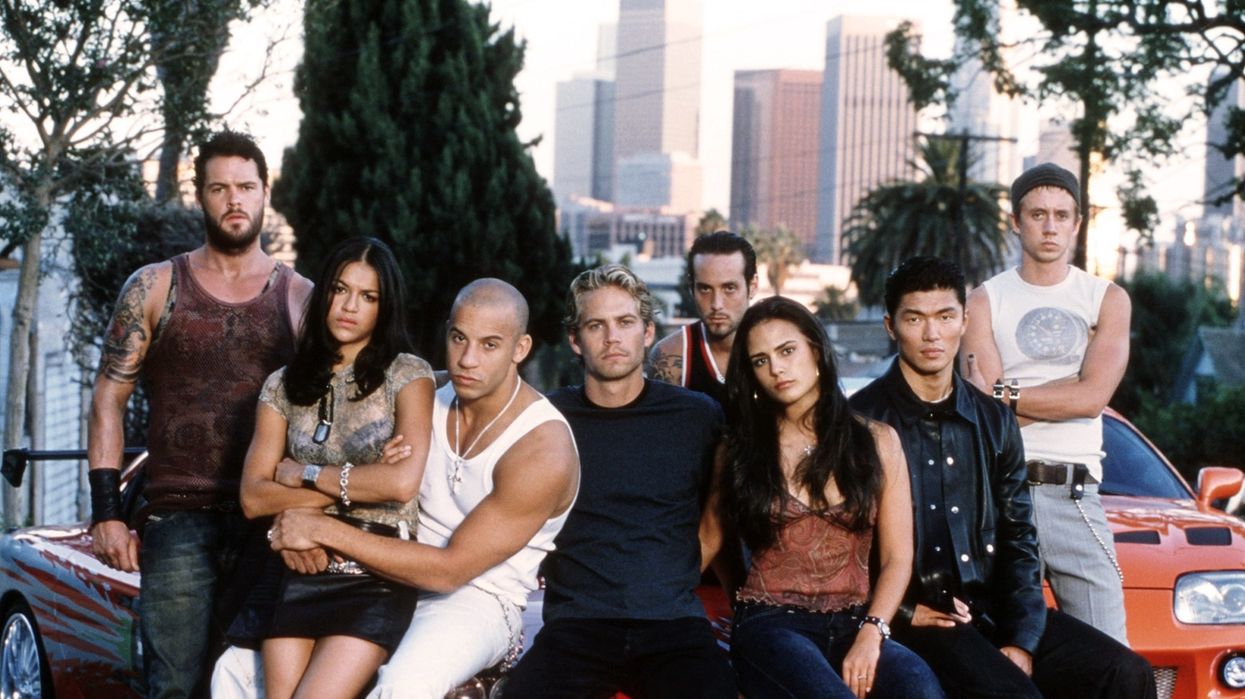'Fast and Furious' Survived Because It's About Empowerment
In the beginning, it was a movie about racers. See how it came together.

Around 20 years ago, producer Neal Moritz brought a Vibe article called "Racer X" to Universal and told them it was going to be the next big thing. They thought he was crazy, but they loved the idea of a Point Break inside the world of street racing.
And they loved that it came with Rob Cohen and Paul Walker attached. They had a script commissioned, and it wound up needing some work. David Ayer was brought on, and he changed it from the mostly white and suburban story in New York to a diverse one in Los Angeles, much like the neighborhood he grew up in.
Still, the movie needed a title, casting, and it needed to see if the public would embrace it.
But this story didn't end with rewrites and casting. Recently, Entertainment Weekly spoke with the original cast and crew to talk about making an instant classic and the way the story built from there.
Let's check out our favorite quotes from the article.
Fast and Furious Survived Because It's About Empowerment
So they had a script and Paul Walker. They filled out the cast with Vin Diesel, who only got the role after Timothy Olyphant turned it down. Diesel came on with a lot of notes about the character, and Ayer sat with him and sussed them out.
When he saw his character owned a Cuban bodega, he actually went to Cuba to try to understand that mentality.
Michelle Rodriguez was added as Letty. She came with her own set of notes, telling Entertainment Weekly, "It was a reality check for them to realize that the streets don't work like that. You don't just get with a guy because he's hot. There's a hierarchy there. Can that hot guy get beat up by who you're dating? If he can, then you don't date him, because why would you want to lose the hierarchy? In order to keep it real, I had to school them: 'I know you guys like Hollywood and all that, but if you want it to be realistic, this is how it really works, and I'm not going to be a slut in front of millions of people, so you're going to lose me if you don't change this.' And they figured it out."
Moritz said, "Obviously the characters were written by men, so it was nice to have that female perspective and really try and dive deep. We wanted everybody to be empowered, whether you were white, Black, Hispanic, male, female, didn't matter to us."
That sense of empowerment permeated through the cast and crew.
When it came to the film's title, Mortiz had to borrow that from someone else.
"We had gone through many titles: Redline, Racer X, Race Wars, Street Wars. They were all cheesy. And I went to watch a documentary on [producer] Roger Corman, who I've known since I was a kid, and there was a little section on a movie he'd made called The Fast and the Furious. I thought, 'That's the title of this movie!' I called up the head of marketing at Universal the next morning and said, 'Okay, I've got the title: The Fast and the Furious!' And there was just silence on the other end. I was like, 'Oh, I guess that is the worst title he's ever heard.' Then a few hours later he calls me and goes, 'That's a great title,' and I'm like, 'I know!' So we made a deal with Roger to give him the use of some stock footage that Universal owned."
That sounds like a pretty good deal.
But they still had to make the movie.
Street racing was illegal, and researching the movie put the cast in some peril. They attended illegal races, and to bond, partied together regularly. They showed up on set, and that chemistry translated. Walker and Diesel became fast friends. And they welcome everyone else into their circle. The movie's mantra was "family," and it showed on screen.
It also showed at the box office. The movie was released on June 22, 2001. The Fast and the Furious opened at number one and would make more than $200 million worldwide, thrusting its stars into the spotlight and changing the course of franchise history.
Ironically, Diesel told the studio he thought they shouldn't make sequels, let the movie stand on its own as a classic. But when it came time for the fourth movie, he and the rest of the surviving original crew came back to set the series off to where it is today.
Check out the whole interview on Entertainment Weekly and tell us your favorite series moments in the comments.
Source: Entertainment Weekly











